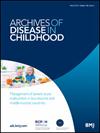Epidemiology, microbiology and antibiotic treatment of bacterial and fungal meningitis among very preterm infants in China: a cross-sectional study
IF 3.9
2区 医学
Q1 PEDIATRICS
Archives of Disease in Childhood - Fetal and Neonatal Edition
Pub Date : 2024-09-18
DOI:10.1136/archdischild-2024-327495
引用次数: 0
Abstract
Objective Neonatal meningitis significantly contributes to neonatal morbidity and mortality, yet large-scale epidemiological data in developing countries, particularly among very preterm infants (VPIs), remain sparse. This study aimed to describe the epidemiology of meningitis among VPIs in China. Design Cross-sectional study using the Chinese Neonatal Network database from 2019 to 2021. Setting 79 tertiary neonatal intensive care units in China. Patients Infants with gestational age <32 weeks or birth weight <1500 g. Main outcome measures Incidence, pathogen distribution, antimicrobial use and outcomes of bacterial and fungal meningitis. Results Of 31 915 VPIs admitted, 122 (0.38%) infants were diagnosed with culture-confirmed meningitis, with 14 (11.5%) being early-onset (≤6 days of age) and 108 (88.5%) being late-onset (>6 days of age). The overall in-hospital mortality was 18.0% (22/122). A total of 127 pathogens were identified, among which 63.8% (81/127) were Gram-negative bacteria, 24.4% (31/127) were Gram-positive bacteria and 11.8% (15/127) were fungi. In terms of empirical therapy (on the day of the first lumbar puncture), the most commonly used antibiotic was meropenem (54.9%, 67/122). For definitive therapy (on the sixth day following the first lumbar puncture, 86 cases with available antibiotic data), meropenem (60.3%, 35/58) and vancomycin (57.1%, 16/28) were the most used antibiotics for Gram-negative and Gram-positive bacterial meningitis, respectively. 44% of infants with Gram-positive bacterial meningitis and 52% with Gram-negative bacterial meningitis received antibiotics for more than 3 weeks. Conclusion 0.38% of VPIs in Chinese neonatal intensive care units were diagnosed with meningitis, experiencing significant mortality and inappropriate antibiotic therapy. Gram-negative bacteria were the predominant pathogens, with fungi emerging as a significant cause. Data are available upon reasonable request. After the publication of the article, the corresponding author may offer de-identified data, but this requires the provision of scientific rationale and sound methods. Requests for data sharing will be processed according to the Chinese Neonatal Network’s data-sharing policy.中国早产儿细菌性和真菌性脑膜炎的流行病学、微生物学和抗生素治疗:一项横断面研究
目的 新生儿脑膜炎是导致新生儿发病率和死亡率的重要原因之一,但发展中国家的大规模流行病学数据,尤其是早产儿(VPI)的数据仍然很少。本研究旨在描述中国极早产儿脑膜炎的流行病学。设计 利用2019年至2021年中国新生儿网络数据库进行横断面研究。地点 中国79家三级新生儿重症监护病房。患者 胎龄 6 天的婴儿)。院内总死亡率为18.0%(22/122)。共鉴定出 127 种病原体,其中 63.8%(81/127)为革兰氏阴性菌,24.4%(31/127)为革兰氏阳性菌,11.8%(15/127)为真菌。在经验性治疗方面(首次腰椎穿刺当天),最常用的抗生素是美罗培南(54.9%,67/122)。在确定性治疗中(首次腰椎穿刺后的第六天,86 个有抗生素数据的病例),美罗培南(60.3%,35/58)和万古霉素(57.1%,16/28)分别是治疗革兰氏阴性和革兰氏阳性细菌性脑膜炎最常用的抗生素。44%的革兰氏阳性细菌性脑膜炎患儿和52%的革兰氏阴性细菌性脑膜炎患儿接受抗生素治疗的时间超过3周。结论 中国新生儿重症监护室有 0.38% 的 VPI 被诊断为脑膜炎,死亡率高且抗生素治疗不当。革兰氏阴性菌是主要病原体,真菌也是重要病因。如有合理要求,可提供相关数据。文章发表后,通讯作者可提供去标识化的数据,但这需要提供科学依据和合理的方法。数据共享请求将根据中国新生儿网络的数据共享政策进行处理。
本文章由计算机程序翻译,如有差异,请以英文原文为准。
求助全文
约1分钟内获得全文
求助全文
来源期刊
CiteScore
9.00
自引率
4.50%
发文量
90
审稿时长
6-12 weeks
期刊介绍:
Archives of Disease in Childhood is an international peer review journal that aims to keep paediatricians and others up to date with advances in the diagnosis and treatment of childhood diseases as well as advocacy issues such as child protection. It focuses on all aspects of child health and disease from the perinatal period (in the Fetal and Neonatal edition) through to adolescence. ADC includes original research reports, commentaries, reviews of clinical and policy issues, and evidence reports. Areas covered include: community child health, public health, epidemiology, acute paediatrics, advocacy, and ethics.

 求助内容:
求助内容: 应助结果提醒方式:
应助结果提醒方式:


